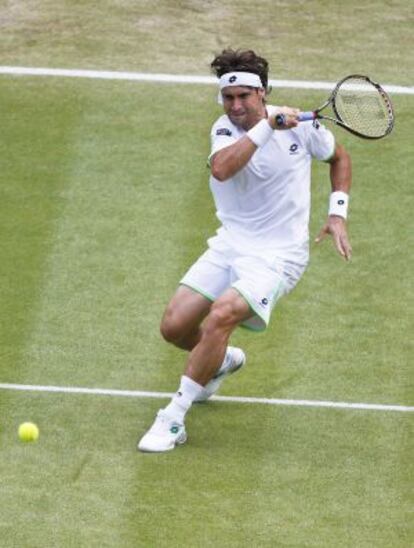The fidelity of Ferrer
Spaniard has stuck with same coach throughout his ever-improving career

"Javier is the boss," said David Ferrer of his coach before Monday's fourth-round clash against Croatia's Ivan Dodig at Wimbledon, which the dogged Spanish player came through in four sets, 6-7, 7-6, 6-1, 6-1, to set up Wednesday's quarterfinal clash with Juan Martín del Potro. Besides being a doughty battler on court, Ferrer is also a loyal man off it. Javier Piles may be absent from this year's tournament at the All England Club for personal reasons, but his relationship with Ferrer is a unique example of stability in the fickle world of elite tennis. The 31-year-old Ferrer has never changed coach, sticking with Piles through thick and thin. And nor has the Alicante man sought to introduce alternative voices into his team of trainers. Among the top 10 in men's tennis, where the search for a tweak to make that telling centimeter of difference is a feverish one, no one else can say the same - not even Rafa Nadal, who mixes the constant guidance of his uncle, Toni Nadal, with sporadic coaching from Francis Roig. "Ferru" has been working with Piles since he was a teenager.
"They are not direct family, like Toni and Rafa, but it is as if Javier was his big brother. He always demands respect, work and the desire to improve," say those who have seen Ferrer and his coach operate within Spain's Davis Cup set-up, where national captains have encouraged players to bring along their personal trainers. "They don't mix up the friendship side with the professional side, in which Javier is very demanding."
But Ferrer says that it is the personal connection that is the key to the relationship with his trainers. "If you look closely, there is something personal with everyone in my team. Javier might not be the best coach in the world, and my physical trainer or my physiotherapist might not be the absolute best at what they do, but I can rely on them. It's because I know they want the best for me, not just in professional terms, but as a person."
Javier might not be the best coach in the world but I can rely on him"
Ferrer, who will become the world number three next Monday after Wimbledon ends, adds that: "I can go to them with a problem. I travel with them, and I spend more time with them than I do with my family and I feel as if they were part of me."
Piles, a man who can run a marathon in less than three hours, has developed the steely character of his charge, inculcating in him the obsession with small details and the desire to improve constantly. At this year's Wimbledon, for example, Ferrer has changed his string tension three times already, looking for the extra ounce of punch that is sometimes lacking from his game. It was Piles who decided on a homemade handle for the Spaniard's racket, a centimeter longer than the standard length in a bid to make up for Ferrer's squat stature (at 1.75m, he is the shortest player amongst the world's top 10).
From the Ferrer who surprised the tennis world by reaching the final of the Master's Cup in 2007, and the Ferrer of 2013, a year in which he has reached his highest career ranking and the French Open final, there is a world of difference. He is serving better, dares to take on backhands down the line and shines when his opponents are on serve. Ferrer is the best in the world this year in terms of winning return games: 39 percent.
The other Spaniard in action on Wednesday will be the anything-but-consistent Fernando Verdasco. The man who has slumped to 54th in the world from his 2009 high of seventh takes on the home favorite, Olympic gold medalist and US Open champion, Andy Murray.
Tu suscripción se está usando en otro dispositivo
¿Quieres añadir otro usuario a tu suscripción?
Si continúas leyendo en este dispositivo, no se podrá leer en el otro.
FlechaTu suscripción se está usando en otro dispositivo y solo puedes acceder a EL PAÍS desde un dispositivo a la vez.
Si quieres compartir tu cuenta, cambia tu suscripción a la modalidad Premium, así podrás añadir otro usuario. Cada uno accederá con su propia cuenta de email, lo que os permitirá personalizar vuestra experiencia en EL PAÍS.
¿Tienes una suscripción de empresa? Accede aquí para contratar más cuentas.
En el caso de no saber quién está usando tu cuenta, te recomendamos cambiar tu contraseña aquí.
Si decides continuar compartiendo tu cuenta, este mensaje se mostrará en tu dispositivo y en el de la otra persona que está usando tu cuenta de forma indefinida, afectando a tu experiencia de lectura. Puedes consultar aquí los términos y condiciones de la suscripción digital.








































